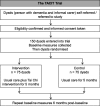A randomised controlled trial comparing the effectiveness of tai chi alongside usual care with usual care alone on the postural balance of community-dwelling people with dementia: protocol for the TACIT trial (TAi ChI for people with demenTia)
- PMID: 30390620
- PMCID: PMC6215631
- DOI: 10.1186/s12877-018-0935-8
A randomised controlled trial comparing the effectiveness of tai chi alongside usual care with usual care alone on the postural balance of community-dwelling people with dementia: protocol for the TACIT trial (TAi ChI for people with demenTia)
Abstract
Background: Falls are a public health issue for the older adult population and more so for people with dementia (PWD). Compared with their cognitively intact peers, PWD are at higher risk of falls and injurious falls. This randomised controlled trial aims to test the clinical and cost effectiveness of Tai Chi to improve postural balance among community-dwelling PWD and to assess the feasibility of conducting a larger definitive trial to reduce the incidence of falls among PWD.
Methods: A 3-centre parallel group randomised controlled trial with embedded process evaluation. One hundred and fifty community-dwelling dyads of a person with dementia and their informal carer will be recruited and assessed at baseline and at six-month follow-up. Dyads will be randomised in a 1:1 ratio to either usual care or usual care plus a Tai Chi intervention for 20 weeks. The Tai Chi intervention will consist of weekly classes (45 min' Tai Chi plus up to 45 min for informal discussion, with up to 10 dyads per class) and home-based exercises (20 min per day to be facilitated by the carer). Home practice of Tai Chi will be supported by the use of behaviour change techniques with the Tai Chi instructor at a home visit in week 3-4 of the intervention (action planning, coping planning, self-monitoring, and alarm clock reminder) and at the end of each class (feedback on home practice). The primary outcome is dynamic balance measured using the Timed Up and Go test, coinciding with the end of the 20-week intervention phase for participants in the Tai Chi arm. Secondary outcomes for PWD include functional balance, static balance, fear of falling, global cognitive functioning, visual-spatial cognitive functioning, quality of life, and falls. Secondary outcomes for carers include dynamic balance, static balance, quality of life, costs, and carer burden.
Discussion: This trial is the first in the UK to test the effectiveness of Tai Chi to improve balance among PWD. The trial will inform a future study that will be the first in the world to use Tai Chi in a trial to prevent falls among PWD.
Trial registration: NCT02864056 .
Keywords: Accidental falls; Behaviour change; Caregiver; Clinical trial; Dementia; Exercise; Feasibility; Postural balance; Tai chi.
Conflict of interest statement
Ethics approval and consent to participate
Approval for the trial has been granted from the West of Scotland Research Ethics Committee 4 (reference: 16/WS/0139) and the Health Research Authority (IRAS project ID: 209193). All participants (both people with dementia and their informal carers), after having time to read the participant information sheet and discuss the project with a member of the research team, will sign an informed consent form to confirm their voluntary participation in the trial.
Consent for publication
Not applicable.
Competing interests
The authors declare that they have no competing interests. Colleagues involved in the trial management group and the trial steering committee also declare that they have no competing interests. The Tai Chi instructors who are delivering the intervention are working under the private company of Elemental Tai Chi. This company already provides Tai Chi classes and private tuition in the areas where participants will be recruited. Therefore, this company may be impacted by the dissemination of its results. However, Elemental Tai Chi will not be involved in the collection of outcome data, analysis of the trial outcomes, or dissemination of results (they will only be allowed to circulate any dissemination activity from the trial).
Publisher’s Note
Springer Nature remains neutral with regard to jurisdictional claims in published maps and institutional affiliations.
References
-
- Johansen A, Wakeman R, Boulton C, Plant F, Roberts J, Williams A. National hip fracture database national report. London: Royal College of Physicians; 2013.
-
- Taylor ME, Delbaere K, Close JCT, Lord SR. Managing falls in older people with cognitive impairment. Ageing Health. 2012;8:573–588. doi: 10.2217/ahe.12.68. - DOI
Publication types
MeSH terms
Associated data
Grants and funding
LinkOut - more resources
Full Text Sources
Medical


